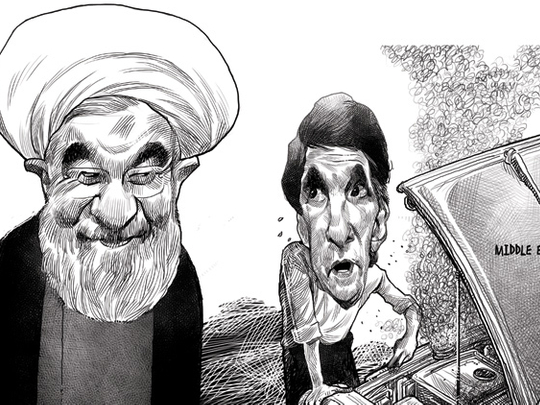
Rapprochement between Iran and the West has long been a “white whale” of global politics. But it increasingly appears that the world may be on the verge of a new era, characterised by a wary yet crucial collaboration between countries — particularly Iran and the US — that had been irreconcilable since Iran’s Islamic Revolution in 1979.
The imperative for such cooperation drove last month’s Bergedorf Round Table, organised by the Korber Foundation in conjunction with the Institute for Science and International Security. At the event, which I attended, 30 politicians, senior officials, and experts from Europe, the US, and Iran considered the relationship’s future, producing some important insights that should inform future policy decisions.
With countries across the Middle East crumbling and territorial sovereignty disintegrating — most notably in Iraq — this effort could not be timelier. To reverse the region’s slide into chaos, it needs strong stabilising forces that can underpin coordinated action aimed at curtailing sectarian violence. Here, Iran has a key role to play.
Beyond its historical and cultural depth, which gives it a certain authority in the Middle East, Iran has one of the region’s few functioning governments capable of responding to geopolitical developments. This is to say nothing of its massive oil reserves, which secure its critical role in the complex global energy equation, particularly as it applies to Europe, which is working to reduce its dependence on Russian energy imports.
The problem is that Iran has consistently squandered its leadership potential, choosing instead to act as a spoiler, especially through the use of proxy armies. This disruptive tendency reinforces the need for collaboration, underpinned by strong incentives for Iran to maintain a constructive, moderate foreign policy. To this end, the nuclear negotiations between Iran and the E3+3 (France, Germany, United Kingdom plus China, Russia and the US) are an important first step. Iran’s nuclear ambitions have long posed a major security threat in the Middle East, as they raise the risk of preemptive military action by Israel or the US and, perhaps even more harrowing, of a regional arms race with the Gulf states. Though fragmentation and sectarian violence have recently become a more urgent danger, the risks associated with Iran’s emergence as a nuclear power should not be underestimated.
Further underlying the significance of the current talks are Iran’s internal political dynamics. If Iranian President Hassan Rouhani is unable to offer citizens concrete economic returns on his engagement with the West — especially loosened international sanctions — by next year’s parliamentary election, hardliners will recapture their dominance over Iran’s foreign policy. Given this, the West has finally found in Rouhani and Iranian Foreign Minister Javad Zarif motivated — and ostensibly effective — interlocutors.
Perhaps the most important motivation for the E3+3 negotiations is that resolving Iran’s nuclear status has become a sine qua non for bringing the country back into the fold of the international community. Iran cannot play a stabilising role in the Middle East as a pariah state.
Most obstructionist elements
This is not to say that negotiators should pursue a deal at any cost. A weak agreement that lacks adequate verification mechanisms and leaves Iran with sufficient enrichment capacity for short-term weapon development will do more harm than good. Beyond stoking Israeli security fears and fuelling increased opposition from an already sceptical US Congress, such a pact would strengthen the position of Iran’s most obstructionist elements, all but eliminating the possibility of constructive future engagement. Reaching an effective, fair agreement will undoubtedly be difficult; but there is reason to believe that it is possible. The current round of talks has produced some progress on one of the issue’s two major sticking points: the heavy-water reactor at Arak.
The other key issue, centrifuges, is more problematic. But alternative metrics — for example, focusing on overall production volume, instead of the number of centrifuges — together with robust monitoring guarantees, could facilitate an agreement.
With the nuclear issue resolved, western leaders could advance cooperation with Iran in other critical areas — beginning with security and stability in the Middle East. Of course, Iran’s involvement in this effort, while important, would not be sufficient to stop the current carnage. Given the sectarian nature of regional conflicts — for which the Iranian authorities bear a heavy responsibility — engagement with Iran must be conducted within a broader framework of regional cooperation, in particular with the Gulf states.
Given that the US and Europe have neither the appetite nor the wherewithal to respond effectively to the cataclysmic developments in the Middle East, solutions will need to come, at least partly, from countries with strong influence on the ground. But, in pursuing collaboration with countries like Iran, Western leaders must remain vigilant, and avoid allowing a sense of urgency to overwhelm their regard for these regimes’ disruptive potential.
Bearing in mind that caveat, the potential benefits of western engagement with Iran cannot be overstated. Over the coming weeks, the US and the EU will have the opportunity to make important strides towards a more stable, secure Middle East — an outcome that will benefit the entire world.
— Project Syndicate, 2014
Ana Palacio, a former Spanish foreign minister and former senior vice-president of the World Bank, is a member of the Spanish Council of State and a visiting lecturer at Georgetown University.










